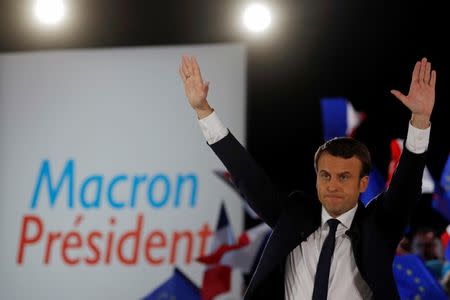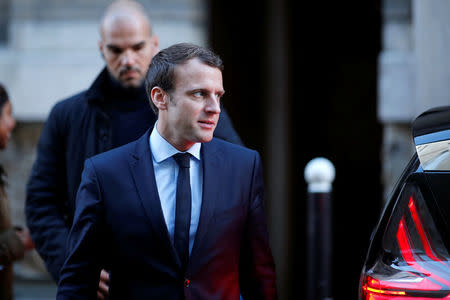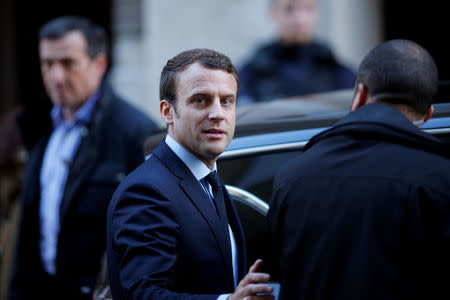Generation Macron: Young liberal EU leaders rally behind French "Kennedy"
By Alastair Macdonald and Noah Barkin BRUSSELS/PARIS (Reuters) - If Emmanuel Macron wins Sunday's French presidential run-off, Europe's pro-EU liberals will finally have their champion. For centrists who have been licking their wounds since Britain voted to quit the EU a year ago, the 39-year-old will be the gallant young hero who slew the most dangerous populist dragon of them all, the National Front's Marine Le Pen. From a Paris dinner party with the young leaders of Belgium and Luxembourg, to a conspicuous Twitter bromance with Italy's ex-premier Matteo Renzi, Macron has already built a circle of likeminded peers, unafraid to promote closer EU integration at a time when voters are being tempted by the hard right and left.The young leaders present themselves as fresh faces, free of 20th-century baggage of left-right class war. But to fulfil their dream of a reinvigorated Europe, they still need to win over leaders from the old school, above all Germany's Angela Merkel. One senior German official said Macron's youthful stardust could give France some "Kennedy-esque" optimism. But the official also injected a sceptical note: Berlin was "willing to talk about Europe", he said, "but the discussion has to be about responsibility as well as solidarity." ERASMUS GENERATION Macron discussed his plans for Europe at a private dinner party in March at the home of a French TV celebrity, attended by Belgium's 41-year-old Prime Minister Charles Michel and Luxembourg's Prime Minister Xavier Bettel, 44. "It was a moment for sharing our commitments on Europe," Michel told Reuters of the dinner, which was kept secret until word leaked out in April. "In the coming months, we're going to have to relaunch the European project ... and for that we will need partners." The three men are part of the first generation of European leaders to come of age with the benefits of EU citizenship. "We are the Erasmus generation," Michel told Reuters, referring to an EU exchange programme that lets students attend universities in other countries across the bloc. As France's youngest-ever president, Macron would step into the shoes vacated by Italy's youngest-ever prime minister, Renzi, who also took office at 39 and who stepped down last year after losing a referendum on constitutional reform. "Bravo to @matteorenzi," Macron tweeted this week. "Together we will change Europe with all the progressives." Renzi tweeted back: "Thank you dear Emmanuel. We are with you." The Paris dinner party, held at Macron's invitation at the home of a TV personality Stephane Bern, a friend of Bettel, showed how the new generation of leaders is comfortable dispensing with the formality of traditional diplomacy. "Everything's got more informal," one person familiar with the dinner said. "They've all got each other's mobile numbers. They text all the time." Guy Verhofstadt, the liberal former Belgian prime minister, Brexit negotiator and champion of more federal EU powers, sees in Macron not just an ally who wants to end old habits of state-to-state wrangling in the EU, but an example of how social media and networking is changing policymaking -- and maybe policy too. "Political action will completely change," Verhofstadt said. Still, however they may be buoyed by a Macron victory, the young liberals will have a steep hill to climb to achieve a broad consensus for closer EU integration. The historically unpopular outgoing president, Francois Hollande, failed to achieve similar aims in Europe and stands as a conspicuous example of how difficult it could be for Macron to persuade the French to back him. All roads to EU change still run through Berlin, where proposals will be met with caution even if Merkel loses re-election this year to her centre-left, EU enthusiast challenger Martin Schulz. Germans widely see French deficit spending as a threat to the euro. Michel, Bettel and liberal Dutch premier Mark Rutte, 50, have jointly proposed an outline for EU reform to be debated after Brexit. It calls for faster integration of some states in a "multispeed Europe", an idea that Germany was long cool to but which Merkel has lately signalled she might consider. Some senior Benelux officials hope for revival of Franco-German harmony. They see a possible "grand bargain" where former banker Macron can eventually persuade Berlin that France can be trusted not to let deficits balloon if Germany is willing to drop its resistance to backing a share of other states' debt. A person close to Macron described the dinner on March 5 as a private meeting between like-minded young European reformers: "It was part of his European outreach efforts." "There is common ground," he said, while stressing Macron would not limit himself to such alliances. "They support Macron’s plans to inject new momentum into the European project and he supports the message sent out by the Benelux countries." (Writing by Alastair Macdonald; editing by Peter Graff)

 Yahoo News
Yahoo News 


